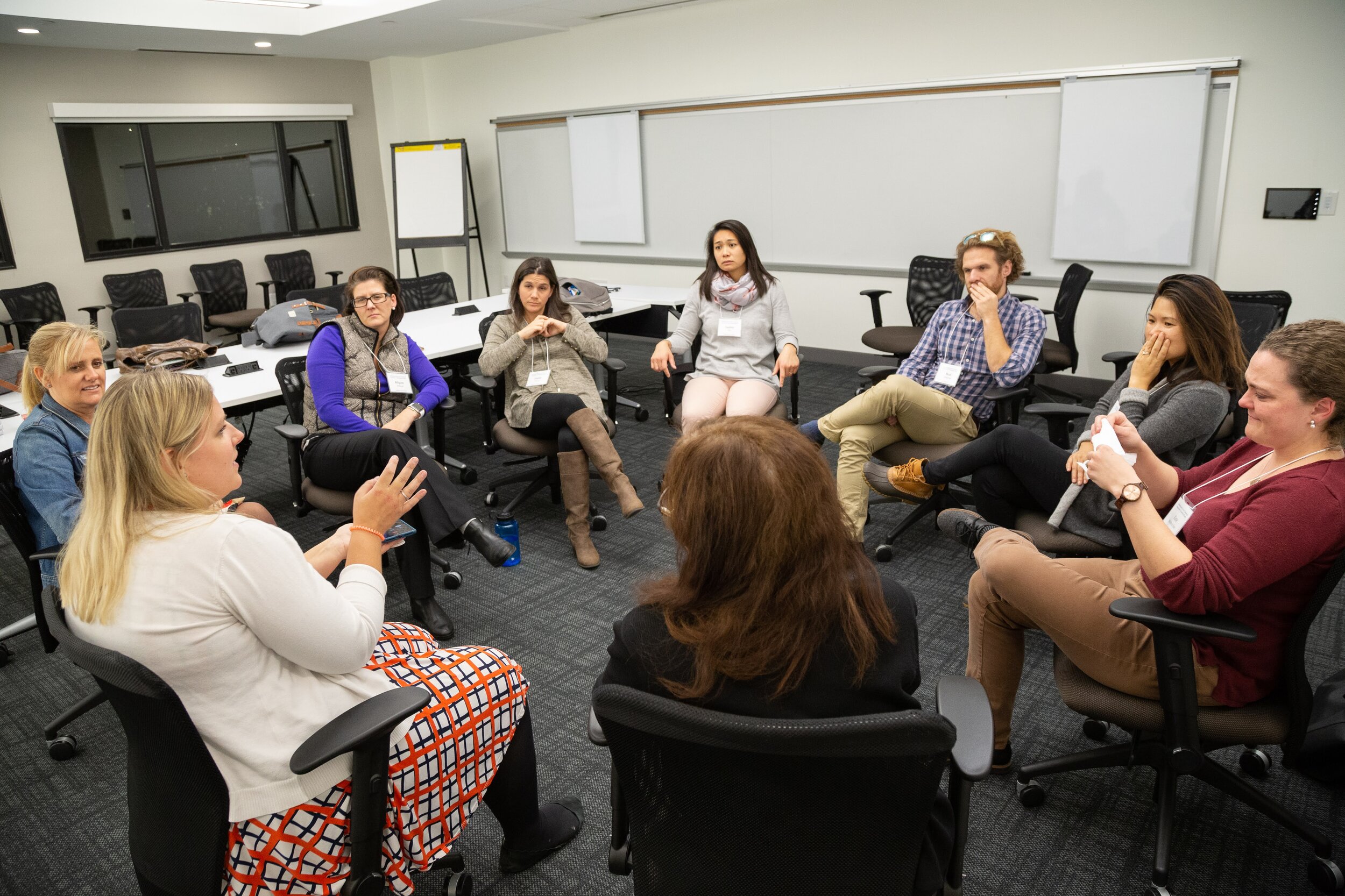Understanding Root Causes of Inequities: Praxis During Pandemics
For the past three years, CYCLE has supported cross-site learning among the six districts involved in the Nellie Mae Education Foundation’s Understanding Root Causes of Inequities grant fund – Cambridge and Waltham, MA, Manchester and Danbury, CT, Manchester, NH, and Central Falls, RI. This grant fund is aimed at supporting these districts to:
2020 Understanding Root Causes of Inequities Convening in Norwood, Massachusetts.
Create deeper understanding of the systemic and school-level barriers that perpetuate gaps based on race, language, special education status, and income;
Identify interventions that appropriately address the identified barriers;
Help districts and communities collaborate on and coalesce around plans to reverse historical patterns of inequity.
One of CYCLE’s core values is learning. We aim to create a culture of inquiry where ideas, information, and discoveries are exchanged. To that end, CYCLE hosted three grantee convenings for teams from the Understanding Root Causes of Inequities districts, as well as an ongoing virtual learning community for district project managers. These participatory learning spaces offered opportunities for building relationships, generating knowledge, engaging in collective learning, and sharing victories and challenges.
In March 2020, as a result of the COVID pandemic, schools in all six districts moved to remote learning. District project managers noted that, while their previous work had helped in building understanding of inequities in their districts, the pandemic, followed quickly by what one project manager called “the racism and civil rights pandemic,” shone an even brighter light on existing inequities. As one project manager said, “This pandemic has just said, hello, the systemic racism is here, we have seen it in every single element of the work that we are doing right now. When we have to ask for certain things that should be part of the regular educational philosophy or approach to learning for our kids, there is something wrong.” Project managers found themselves working to ensure student access to remote learning (tablets, hot spots), helping provide meals to students and their families, and dealing with trauma brought about by both pandemics.
In November 2020, representatives from four of the Understanding Root Causes of Inequities districts served as panelists on a webinar, moderated by Gislaine Ngounou, Vice President of Strategy and Programs at the Nellie Mae Education Foundation, to reflect on ongoing efforts to center educational equity in the context of the coronavirus pandemic and national uprisings and resistance in response to police violence, systemic racism, and anti-blackness. Topics for that conversation were framed by dimensions of The Equity Centered School Reform Continuum, developed by the Metropolitan Center for Research on Equity and the Transformation of Schools at New York University during their documentation of the Understanding Root Causes of Inequities project. The following summary presents themes from that conversation, including lessons learned during this time and thoughts about moving forward post-pandemic.
Lessons Learned
2020 Understanding Root Causes of Inequities Convening in Norwood, Massachusetts.
Attending to the whole child: Balancing wellness, wellbeing, and rigor
District representatives universally commented on how the pandemic forced them to more actively attend to wellness and wellbeing, not just of students but also of families. There was a groundswell of support and effort among district and school staff to understand basic needs first -- food, housing, employment, the trauma caused by racism and racist systems -- while also focusing on learning.
Strengthening family partnerships
While building authentic partnerships with families had been on-going work throughout the Understanding Root Causes of Inequities project, district representatives noted that the pandemic served to highlight and provide even more urgency for districts to strengthen partnerships with parents. One project manager said, “If there is a silver lining in this pandemic, relational trust is at the level we’ve never seen before. So before where we were kind of sharing information, oh, we’ll have a parent night or send a text or we’ll provide you with this resource, it’s really shifted now to where parents and families are our co-pilots. We have to partner with them in this work for the success of their kids. So it’s really shifted to education and building the capacity of the community.”
Cultural relevance
“We can’t do these operational things like put a book in front of a child because it has Black and Brown people in it and say we are being culturally responsive.”
District representatives discussed how remote learning shone a light on the importance of cultural relevance for students’ learning -- and for diversifying the teaching force to more closely match student demographics. As one project manager said, “We can’t do these operational things like put a book in front of a child because it has Black and Brown people in it and say we are being culturally responsive.” In a context in which the scope of inequities could feel overwhelming, one district representative noted the importance of focusing on their “sphere of influence” -- what is happening with educators in classrooms. Multiple promising pathways were mentioned, from “grow your own” teacher programs that create a pipeline for educators with lived experiences similar to those of their students, to providing spaces for educators to be vulnerable and simply say, “I don’t know how to do this, I wasn’t taught this, I wasn’t given the skills,” and providing needed professional development.
Youth voice and leadership
“We often have these adult-driven initiatives and then put young people at the forefront because they are cute or because we want to make it seem like young people are initiating this kind of change, when actually it is an adult initiative that involves youth.”
While most of the districts had placed a strong focus on the importance of youth voice and leadership throughout the project, the pandemics provided more opportunities for youth to have a say in their education -- with support from their districts. In some cases, this meant appointing a staff member to the “revolutionary role” of centering student voices not just in pockets but across the school district. In the past, according to one district representative, “We often have these adult-driven initiatives and then put young people at the forefront because they are cute or because we want to make it seem like young people are initiating this kind of change, when actually it is an adult initiative that involves youth.” District representatives pointed to changes that are beginning to place students in positions to take power and have a role in hiring staff, making policy, and pushing the school board.
Communication
District representatives stressed the overall importance of frequent communication with students and their families. They said that these communications couldn’t be just about grades, discipline, or attendance but instead about how families were doing and how the district could provide them with needed resources. They emphasized the importance of including common language and messaging around anti-racism and relational culture any time district and school leaders spoke, and in any communications with students, families, and the community.
Moving Forward
As the Understanding Root Causes of Inequities districts continue to face the uncertainty of the ongoing COVID-19 pandemic, many of them spoke of an unexpected silver lining -- the necessity of deeply rethinking (again) how school and schooling work with an equity lens. Throughout the lessons named above, the central theme of relational trust -- building supportive relationships among different stakeholders in safe spaces -- resonated, and will be a critical factor going forward. District representatives expressed that they were hopeful and encouraged about their interactions and relationship-building with students and families and were optimistic about what comes next.
2020 Understanding Root Causes of Inequities Convening in Norwood, Massachusetts.
They were also cautious about how easy it would be for districts to revert to the old ways of doing things after the end of the pandemic. They stressed the importance of building new structures to support equitable education, rather than clinging to old structures and systems that reinforce historical oppression and injustice. In addition to structural change, they noted that an ongoing focus on educational equity requires a shift in mindsets and beliefs. This entails moving from a school-centric to a student-centric philosophy of education, articulating what it really means to educate for liberation, democracy, and justice, and finding ways to move toward that vision in partnership with students, families, and communities.



